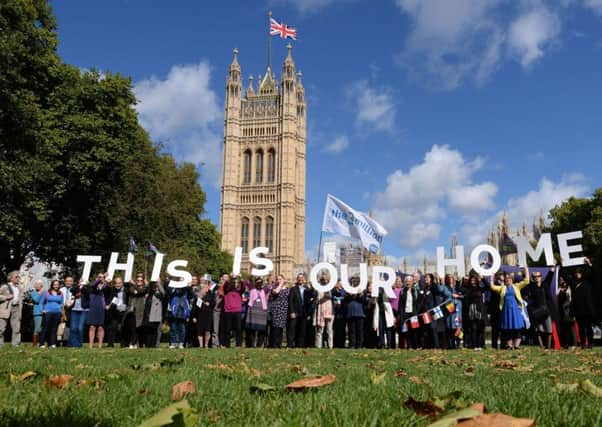Brexit risks '˜triggering Scotland-England trade war'


In comments underlining the risk posed to the union by the UK’s withdrawal from the EU, Damian Green warned there could be “subsidy wars” over the price of lamb if the UK Government agrees to demands for all agriculture powers to be devolved.
UK ministers fear a more generous subsidy regime would see lamb reared on Scottish hill farms push English produce off the shelves, and believe food could be turned away at the border if Holyrood is able to impose its own regulatory regime.
Advertisement
Hide AdAdvertisement
Hide AdThe Scottish Government says it is willing to strike UK-wide agreements to avoid internal trade barriers, but insists these must be mutually agreed and not imposed.
“We need to make sure that we don’t have subsidy wars to try to help sheep farmers, some in Scotland and some in Wales and so on,” Mr Green, the First Secretary of State, told the website Politico.
“We must ensure the benefits of free trade around the UK, which we’ve all taken for granted because we are one country, are preserved after Brexit because a lot of the rules about trade have been operated at a European level rather than at a UK level.”
SNP and Labour administrations in Scotland and Wales have attacked the UK Government’s plans to hold on to responsibilities in some devolved areas after Brexit as a “power grab”.
Ms Sturgeon and her Welsh counterpart Carwyn Jones are demanding amendments to the European Union (Withdrawal) Bill currently making its way through Westminster, warning it threatens the central principle of devolution that anything not explicitly reserved at Westminster, like agriculture, is devolved.
Unless changes are made to the bill, legislatures in Edinburgh and Cardiff could trigger an unprecedented constitutional crisis by refusing to give their consent.
The issue of farm subsidies is particularly sensitive in Scotland, which receives 17% of the UK’s share under the current EU Common Agricultural Policy, despite having 8% of the population.
Advertisement
Hide AdAdvertisement
Hide AdScottish farmers face greater challenges than their UK counterparts, with 85% of land classed as ‘less favourable’ meaning more financial support is needed.
Mr Green admitted that minimizing conflict with devolved administration was one of the biggest challenges of delivering Brexit, and the most likely to produce a ‘crisis’.
He said: “All the devolution settlements were created while we were a member of the EU and when they were being written, none of the various governments which wrote them thought, ‘Well, what happens if?’ There is just no provision in the devolution settlements for leaving the EU.”
A spokesman for Michael Russell, the Scottish Government’s Brexit minister, said: “Devolved powers currently operated at EU level must be returned to Edinburgh, not Westminster, in line with what people across Scotland voted for in the 1997 referendum.
“We are not opposed in principle to common UK-wide frameworks – but that must be by mutual agreement and not by imposition.
“As they stand, the UK Government’s proposals are a blatant power grab, and we cannot recommend that the Scottish Parliament gives its consent.”